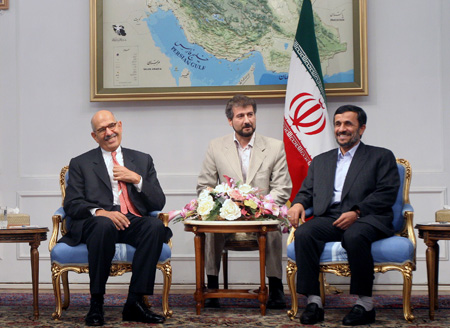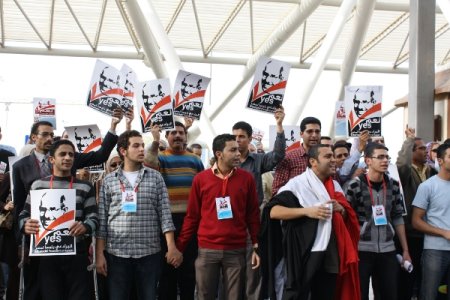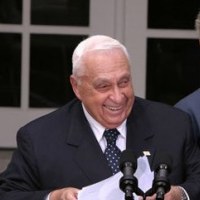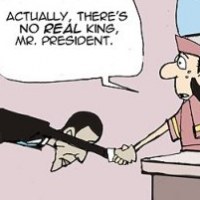Published: april 22, 2010; Jonathan Schanzer – The ElBaradei Candidacy. Also published in the Weekly Standard edition, April 26, 2010, Vol. 15, No. 30.
by Jonathan Schanzer and Khairi Abaza,
The ElBaradei Candidacy
Egypt’s Potential Savior, Iran’s Nuclear Enabler, or Both?
The seemingly interminable reign of President Hosni Mubarak has suppressed Egypt’s domestic political scene for decades. The Pharaoh, as he is known, has held an iron grip on power since the assassination of Anwar el-Sadat in 1981. In recent weeks, however, Egyptians have been expressing tempered enthusiasm that political change may be in the air. Their inspiration: the man whom the West should blame if Iran gets a nuclear weapon.
Mohamed ElBaradei, head of the International Atomic Energy Agency from 1997 to 2009 and winner of the 2005 Nobel Peace Prize, has taken up Egyptian politics. His popularity grows by the day. Crowds throng to catch a glimpse of him at Cairo International Airport. A Facebook fan page, “Mohamed ElBaradei,” has more than 131,000 members. This bald and bespectacled former nuclear inspector is a surprisingly strong contender for the 2011 presidential elections.
ElBaradei, however, won’t admit that he is actually running. Though supporters created a website called elbaradei2011.com, he insists he is not fighting for Egypt’s top office. Rather, he says he is working for a set of reforms that will allow for free and fair elections in Egypt and end the authoritarian rule first established by Gamal Abdel-Nasser after his military coup in 1952. ElBaradei seeks to act as a catalyst for the various opposition and protest movements to herald a new era of liberal democracy.
ElBaradei believes that failure will lead to violence in Egypt. As he told the Associated Press, “Egyptians are desperate for change. We hope that the fate of the Egyptian opposition will not be that of the opposition in Iran”—a reference to the ongoing clashes between reformers and regime forces in the Islamic Republic.
ElBaradei’s reluctance to officially throw his hat in the ring likely stems from the limits imposed by the Egyptian constitution. The way the laws are currently structured, the Mubarak regime decides who becomes president.
For one, the constitution requires independent candidates to have the support of 250 members of parliament. This is an impossible task, since only the ruling National Democratic party has this many elected officials. Opposition candidates must also have held a leadership position for at least one year prior to the election in a political party established for five years with at least 3 percent of the seats in parliament.
ElBaradei knows that he cannot meet these requirements. Beyond the fact that he left the IAEA only last year, if he joined any of Egypt’s 24 licensed opposition parties, the regime would have the authority to shut it down. So ElBaradei focuses on reform. His ideas include: ending the emergency laws in place since 1981; amending the constitution to include judicial supervision of elections; limiting the president to two terms; allowing the 6 million Egyptians
living overseas to vote; and other measures that would create a more democratic political system.
At its core, ElBaradei’s rhetorical platform is a page from the Barack Obama playbook. Promises of change and hope for a better tomorrow are universal messages. In late February, after meeting with a wide spectrum of opposition and independent reformers, ElBaradei created the Egyptian Association for Change, a version of Obama’s Organizing for America.
Mubarak has not announced whether he will run again for president in 2011, but he has been grooming his son Gamal to succeed him. Either way, he rightly views ElBaradei’s bid for power as a threat. In early March, Mubarak said ElBaradei was welcome to make a run for the presidency in 2011, but only if he abides by the rules, signaling that the current political system, which is inhospitable to an ElBaradei candidacy, must remain intact.
But Mubarak knows that he is contending with the idea of reform as much as the person of ElBaradei. Popular support for ElBaradei on the Egyptian street is swelling. Public figures such as George Isaac from the Kefaya (“Enough”) movement, former cabinet minister and politician Yehia el-Gamal, and poet Abdul-Rahman Youssef are leading an “official popular campaign for Baradei” on the Internet that has attracted tens of thousands of Egyptian campaign volunteers.
ElBaradei could never have reached this position without having first achieved prominence in the West as the director general of the IAEA—he was previously a bureaucrat in the Egyptian mission to the United Nations and an assistant to the foreign minister of Egypt. His regular appearances on al-Jazeera, al-Arabiya, and other popular satellite news channels as the head of the nuclear watchdog made him famous in the living rooms and coffeehouses of Egypt. The majority of Egypt’s 79 million people are proud of the fact that a countryman held such a prominent role on the world stage and won a Nobel.
His reputation in the West is much more ambivalent. A strong argument can be made that ElBaradei sat on his hands while Iran made the most important strides in its illicit drive to develop nuclear weapons. While Iran has not yet acquired the bomb, analysts are unanimous that the mullahs are getting close. ElBaradei, for his part, seemed unwilling to accept this, even at the tail end of his term, when the evidence was glaring.
In September 2009, he stated that there was no concrete evidence that Iran even had a nuclear weapons program. “In many ways,” he stated, “I think the threat has been hyped.” The same month when reports surfaced that the IAEA was withholding evidence of Iranian nuclear activity, ElBaradei’s organization fired back, insisting again that there was “no concrete proof that there is or has been a nuclear weapons program in Iran.” In November, responding to an Iranian announcement that it had started work on a new nuclear plant, ElBaradei stated that the fortified underground site near the city of Qom was “nothing to be worried about.”

Iran's President Mahmoud Ahmadinejad (R) meets with (former) Director General of the International Atomic Energy Agency (IAEA) Mohamed ElBaradei (L) in Teheran, capital of Iran, Oct. 4, 2009. (Xinhua/Ahmad Halabisaz)
Considering this record, it is surprising that ElBaradei’s reputation is as strong as it is in his home country. Egypt has been at odds with Iran since the 1979 Islamic Revolution. The mullahs renounced all ties with Egypt when Cairo granted asylum to ousted Shah Mohammed Reza Pahlavi, and relations became downright cantankerous after Egypt made peace with Israel. After the 1981 assassination of Sadat, Iran erected a four-story mural lionizing the assassin, Khaled Islambouli, on a large building in Tehran.
Egypt, a Sunni state, is alarmed over Iran’s violent influence among Iraq’s radical Shiites, and the potential for Tehran to create a large sphere of influence—a “Shiite Crescent” —from Iraq to Lebanon and beyond. And then there is Tehran’s meddling in the Gaza Strip, which abuts Egypt. Iran helped train and arm Hamas to carry out the violent 2007 coup that gave it control of Gaza and, in the process, brought instability to Egypt’s doorstep.
Yet, when it comes to ElBaradei, Egyptians don’t care. They view him as the man who can finally bring democracy to Egypt after more than a half-century of authoritarian rule.
Washington, of course, welcomes the idea of a democratic Egypt. Despite the Obama administration’s cutbacks in the financing of democratization programs in the Arab world, the State Department still views liberal reform as key to beating back the forces of radical Islam. Egypt would be a big win. Indeed, Arabs refer to Cairo as Umm al-Dunya, the mother of the world.
Is Mohamed ElBaradei the man who can bring about this sea change and fulfill the Bush Doctrine in the most influential country in the Middle East? Many Egyptians seem to think he could be. Westerners remain, however, rightly untrusting of the man who was asleep at the switch while Iran defied the world and inched ever closer to its nuclear bomb.
About the authors:
Khairi Abaza is a senior fellow at the Foundation for Defense of Democracies, focusing on Arab politics. Jonathan Schanzer is the foundation’s vice president for research.



 RSS
RSS













The El-Baradei Candidacy #egypt #elbaradei #president #iaea http://j.mp/9Un4dC
[…] . Jonathan Schanzer is the foundation’s vice president for research. … Original post: The ElBaradei Candidacy | Middle East Affairs Information Center … Share and […]
RT @CrethiPlethi: The El-Baradei Candidacy #egypt #elbaradei #president #iaea http://j.mp/9Un4dC
[…] This post was mentioned on Twitter by Elisabeth, Crethi Plethi. Crethi Plethi said: The El-Baradei Candidacy #egypt #elbaradei #president #iaea http://j.mp/9Un4dC […]
Many Egyptians are apathetic about participating in elections because they don’t believe they can effect change in a corrupt system.
Cairo International Airport